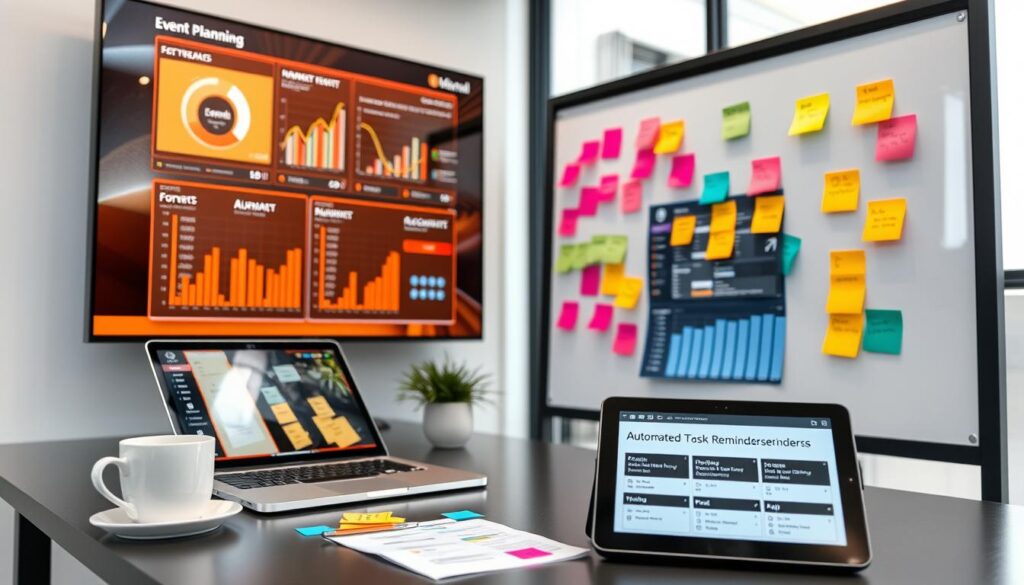In today’s fast-paced world, event planning can be a challenging and time-consuming task. However, with the right tools and strategies, you can streamline your event planning process and save valuable time and resources. This article will explore how to automate event planning, covering the benefits of automation, essential event management software, and various automation tools to simplify your workflow.
Key Takeaways
- Discover the advantages of automating event planning to simplify your process
- Explore essential event management software and features to streamline your workflow
- Learn about automated event scheduling, logistics, registration, and communication tools
- Understand how to leverage AI and data analytics for improved event planning and reporting
- Discover ways to integrate event planning automation tools with your existing systems
Understanding Event Planning Automation
Event planning can be a complex and time-consuming process, but the rise of event management software and event automation tools has revolutionized the way event planners approach their work. Event planning automation refers to the use of technology to streamline various aspects of the event planning process, from scheduling to logistics management.
What is Event Planning Automation?
Event planning automation involves the use of specialized software and tools to automate repetitive tasks, such as automated event scheduling, venue and vendor management, and event registration and ticketing. By leveraging these technologies, event planners can free up valuable time and resources to focus on higher-level strategic decisions and deliver more engaging experiences for attendees.
Benefits of Automating Event Planning
Automating the event planning process can offer a range of benefits, including:
- Increased Efficiency: Automating routine tasks can significantly reduce the time and effort required to organize an event, allowing event planners to be more productive and responsive to changing needs.
- Reduced Errors: Automated systems can help eliminate human errors, ensuring that critical details and deadlines are not overlooked.
- Improved Data Management: Event planning automation tools often include robust data management features, making it easier to track and analyze important event metrics.
- Enhanced Attendee Experience: By automating mundane tasks, event planners can devote more attention to creating engaging and memorable experiences for attendees.
As the event industry continues to evolve, the adoption of event planning automation is becoming increasingly essential for event professionals looking to streamline their processes and deliver exceptional experiences.
how to automate event planning
Streamlining your event planning process has never been easier, thanks to the rise of powerful automation tools. By leveraging these innovative solutions, event planners can simplify their workflows, boost productivity, and deliver exceptional experiences for their attendees. Let’s explore the step-by-step approach to automating your event planning.
The first step in automating your event planning is to identify the key areas that can benefit from automation. This may include tasks such as scheduling, vendor management, registration, and communication. By pinpointing these repetitive and time-consuming tasks, you can prioritize which aspects of your process to automate first.
- Evaluate your current event planning workflow and pinpoint the areas that can be automated.
- Research and select the right event management software and tools that align with your specific needs.
- Integrate the chosen automation solutions seamlessly into your existing processes.
- Train your team on how to effectively utilize the new automated tools and workflows.
- Continuously monitor and refine your automated processes to ensure maximum efficiency.
One of the key benefits of event planning automation is the ability to streamline your communication with attendees, vendors, and stakeholders. Automated email and SMS reminders can ensure that important details and updates reach the right people at the right time, enhancing the overall event experience.
“Automating event planning has been a game-changer for our team. We’ve seen a significant increase in efficiency and can now focus on the strategic aspects of event management.”
By embracing how to automate event planning, event planners can free up valuable time and resources, allowing them to prioritize the creative and strategic elements of their events. The result is a more seamless, personalized, and memorable experience for all involved.
Essential Event Management Software
Organizing a successful event requires a comprehensive set of tools and software to streamline the planning process. Event management software has become an indispensable resource for event professionals, providing a centralized platform to manage various aspects of event logistics. These powerful tools not only simplify the event planning journey but also enhance efficiency, collaboration, and data-driven decision-making.
Features to Look for in Event Software
When selecting event management software, it’s essential to consider the following key features:
- Venue and Vendor Management – Seamless coordination with venues, caterers, and other suppliers to ensure a seamless event experience.
- Attendee Registration and Ticketing – Streamlined event registration, payment processing, and ticketing management to provide a hassle-free experience for attendees.
- Event Scheduling and Agenda Building – Intuitive tools to create and manage event schedules, speaker sessions, and agendas.
- Reporting and Analytics – Comprehensive data and insights to measure event performance, attendance, and ROI.
- Marketing and Promotion – Integrated features to promote the event, manage guest lists, and communicate with attendees.
- Collaboration and Communication – Seamless team coordination and real-time updates to ensure everyone is on the same page.
| Event Management Software | Key Features | Pricing |
|---|---|---|
| Cvent | Venue search, event registration, marketing, analytics | Custom pricing |
| Eventbrite | Ticketing, event creation, promotion, reporting | Free to $0.99 + 2.5% per ticket |
| Bizzabo | Event websites, registration, networking, analytics | Custom pricing |
By leveraging the right event management software, event organizers can streamline their planning process, enhance the attendee experience, and gain valuable insights to drive future event success.
Automated Event Scheduling Tools
One of the most time-consuming aspects of event planning is scheduling. Fortunately, the rise of automated event scheduling tools has revolutionized this process, simplifying it and improving efficiency. These innovative solutions offer a range of benefits that can streamline your event planning workflow and enhance the attendee experience.
Automated scheduling tools can help you avoid conflicts, ensure accurate scheduling, and provide a seamless experience for your attendees. By integrating these tools into your event planning process, you can save valuable time and resources, allowing you to focus on other important aspects of your event.
Top Automated Scheduling Tools
- Calendly: A popular scheduling tool that allows you to share your availability and book meetings with ease.
- Acuity Scheduling: A comprehensive scheduling solution that offers features like online booking, client management, and payment processing.
- Zoho Schedule: A versatile scheduling tool that integrates with other Zoho products, making it a great choice for businesses already using the Zoho ecosystem.
- Bookafy: A user-friendly scheduling platform that offers customizable booking pages and integrations with various calendar and communication tools.
| Tool | Key Features | Pricing |
|---|---|---|
| Calendly |
|
Free plan available, paid plans start at $8/month |
| Acuity Scheduling |
|
Paid plans start at $15/month |
| Zoho Schedule |
|
Free plan available, paid plans start at $3/user/month |
| Bookafy |
|
Free plan available, paid plans start at $9/month |
By incorporating these automated event scheduling tools into your planning process, you can streamline your workflow, improve scheduling accuracy, and provide a seamless experience for your attendees.
“Automated scheduling tools have been a game-changer for our event planning team. We’ve been able to reduce scheduling conflicts and improve the overall attendee experience.” – Jane Doe, Event Planner
Streamlining Event Logistics Automation
Event logistics can be a complex and overwhelming aspect of event planning. Fortunately, automation can simplify various logistical tasks, including venue and vendor management, as well as transportation and accommodation coordination. By leveraging the right tools and strategies, event planners can streamline these processes, ensuring a seamless and efficient event execution.
Venue and Vendor Management
Automating venue and vendor management can save event planners significant time and effort. Event logistics automation solutions often include features that allow for seamless communication with venues and vendors, streamlining the negotiation, booking, and contract management processes. These tools can also help organize and manage vendor information, ensuring that all details are readily accessible and up-to-date.
Transportation and Accommodation Coordination
Coordinating transportation and accommodation for event attendees can be a time-consuming task, but automation can simplify this process. Event logistics automation tools can assist with booking and managing transportation options, such as shuttles, rideshares, and car rentals. Similarly, these solutions can help coordinate hotel reservations and room blocks, ensuring that attendees have a smooth and convenient experience.
By embracing event logistics automation, event planners can streamline the management of venues, vendors, transportation, and accommodations, freeing up time and resources to focus on other critical aspects of the event planning process.
Automated Event Registration and Ticketing
In the dynamic world of event planning, streamlining the registration and ticketing process is a crucial step towards success. Automated event registration and ticketing solutions offer a seamless experience for both organizers and attendees, enhancing efficiency and improving data management.
Automated event registration systems can significantly reduce the time and effort required to handle registrations. These cutting-edge tools automate the entire process, from collecting attendee information to managing payment processing and generating confirmations. By eliminating manual data entry, organizers can ensure accurate and up-to-date participant records, while providing a user-friendly experience for registrants.
Automated ticketing systems, on the other hand, simplify the ticket sales and distribution process. Event planners can leverage these tools to set up intuitive online ticketing portals, handle secure transactions, and track ticket sales in real-time. This level of automation not only enhances the attendee experience but also provides valuable insights into event demand and attendance patterns.
| Feature | Benefit |
|---|---|
| Automated registration forms | Streamlined data collection and improved accuracy |
| Integrated payment processing | Secure and efficient ticket sales |
| Real-time sales and attendance tracking | Enhanced visibility and data-driven decision making |
| Customizable ticketing portals | Seamless and branded attendee experience |
By embracing automated event registration and ticketing solutions, event planners can focus on the core aspects of their events, confident that the administrative tasks are being handled efficiently. This integration of technology into the event planning workflow not only enhances the overall experience but also empowers organizers to make data-driven decisions and deliver exceptional events.
“Automated event registration and ticketing have been game-changers for our team. We’ve seen a significant reduction in administrative workload and a dramatic improvement in the attendee experience.”
Leveraging AI for Event Planning Automation
The event planning industry is rapidly embracing the power of Artificial Intelligence (AI) to streamline and optimize various aspects of the planning process. AI-powered tools are revolutionizing how event organizers approach their tasks, from automating tedious administrative work to personalizing attendee experiences.
One of the primary benefits of leveraging event planning AI is the ability to automate repetitive tasks. AI-driven algorithms can handle tasks like venue and vendor selection, scheduling, and even budget management, freeing up event planners to focus on more strategic and creative aspects of their work. By automating these mundane tasks, event planners can improve efficiency, reduce the risk of human error, and ultimately deliver a more seamless experience for their clients.
Moreover, event planning automation enabled by AI can also enhance the personalization of attendee experiences. AI-powered chatbots and virtual assistants can provide personalized recommendations for sessions, activities, and even dining options based on attendee preferences and past behavior. This level of customization not only improves attendee satisfaction but also helps event organizers better cater to the unique needs of their audience.
In addition to task automation and personalization, AI-driven analytics can provide event planners with valuable insights to make data-driven decisions. AI-powered tools can analyze event data, track attendee engagement, and identify trends that can inform future event planning strategies. This data-driven approach enables event organizers to optimize their events, measure their success, and continuously improve the overall experience.
As the event planning industry continues to evolve, the integration of event planning AI and event planning automation will become increasingly crucial for event organizers to stay ahead of the curve. By leveraging these cutting-edge technologies, event planners can streamline their workflows, enhance the attendee experience, and ultimately deliver more successful and impactful events.
Automated Event Reminders and Communication
In the dynamic world of event planning, effective communication is the backbone of success. Automated event reminders and communication tools have emerged as game-changers, streamlining the process and enhancing the overall event experience. From improved attendee engagement to reduced no-shows, these automated solutions are revolutionizing the way event organizers connect with their audience.
Email and SMS Reminders
Automated email and SMS reminders are two powerful tools in the event planner’s arsenal. By leveraging automated event reminders, organizers can ensure that attendees stay informed and engaged throughout the event lifecycle. These timely alerts not only boost registration and attendance rates but also foster a sense of anticipation among participants.
Email reminders, for instance, can be scheduled to notify attendees of important event details, such as the date, time, location, and any necessary preparations. SMS reminders, on the other hand, provide a more immediate and direct communication channel, allowing organizers to deliver last-minute updates or urgent information directly to attendees’ fingertips.
The advantages of event planning automation through automated reminders are numerous. They help reduce no-shows, improve event logistics, and create a seamless experience for both organizers and attendees. By automating these communication touchpoints, event planners can focus their efforts on other critical aspects of event management, ensuring a more streamlined and successful event.
“Automated event reminders are a game-changer in the world of event planning. They not only boost attendance but also foster a deeper connection between organizers and their audience.”
Automated Event Reporting and Analytics
In the world of event planning, measuring the success of an event is crucial for future improvements and strategic decision-making. Fortunately, the advent of automated event reporting and analytics has revolutionized the way event organizers track and analyze their events.
One of the primary benefits of event planning automation is the ability to access real-time data insights. By leveraging advanced analytics tools, event planners can gain a deeper understanding of attendee behavior, event performance, and overall return on investment (ROI). This data-driven approach empowers organizers to make informed decisions, optimize their event strategies, and deliver exceptional experiences for their guests.
When it comes to automated event reporting, there are a variety of powerful tools available. These solutions can seamlessly integrate with your event management workflow, automating the data collection and analysis process. From tracking ticket sales and registrations to monitoring social media engagement and event feedback, these tools provide a comprehensive view of your event’s success.
| Feature | Benefit |
|---|---|
| Real-time data insights | Gain immediate visibility into event performance, allowing for timely adjustments and optimizations. |
| Customizable reporting | Generate detailed reports tailored to your specific event goals and KPIs. |
| Automated data integration | Seamlessly consolidate data from various sources, streamlining the reporting process. |
| Predictive analytics | Leverage machine learning algorithms to forecast future event trends and attendance patterns. |
By embracing the power of automated event reporting and analytics, event planners can make data-driven decisions, optimize their event strategies, and deliver exceptional experiences that keep attendees coming back year after year.
Integrating Event Planning Automation Tools
To maximize the benefits of event planning automation, it’s essential to integrate your chosen event management software and event automation tools into a cohesive system. By bridging these systems, event planners can create a more streamlined and data-driven approach to event management, leading to better decision-making and improved overall event success.
Connecting with CRM and Marketing Tools
Integrating your event planning automation tools with your customer relationship management (CRM) and marketing platforms can unlock a wealth of valuable insights and opportunities. By syncing data between these systems, you can:
- Gain a 360-degree view of your attendees, from their event engagement to their overall relationship with your organization.
- Personalize your event marketing and communication efforts, delivering more relevant and compelling content to your audience.
- Automate the flow of data between your event tools and CRM, ensuring seamless data transfer and eliminating manual data entry.
- Leverage audience insights to inform your event strategy, tailoring future events to better meet the needs and preferences of your attendees.
By integrating your event management software, event automation tools, CRM, and marketing platforms, you can create a powerful ecosystem that streamlines your event planning process and drives greater event success.
“Integrating your event planning tools with your CRM and marketing platforms is a game-changer. It allows you to create a truly data-driven approach to event management that delivers exceptional experiences for your attendees.”

Conclusion
In the realm of event planning, automation has emerged as a game-changer, revolutionizing the way professionals manage and execute their events. By leveraging the right tools and strategies, event planners can streamline their workflows, reduce errors, and deliver exceptional experiences for their attendees. This article has provided a comprehensive overview of event planning automation, covering the key benefits, essential software, and various automation tools to simplify the process.
Through the implementation of event planning automation, professionals can free up valuable time and resources to focus on the creative and strategic aspects of their events. By automating tasks such as scheduling, logistics, registration, and communication, event planners can ensure a seamless and efficient event experience, ultimately driving the success of their events.
As we look to the future, the integration of event planning automation with cutting-edge technologies, such as AI and advanced analytics, will continue to transform the industry. By embracing these advancements, event professionals can gain deeper insights, make more informed decisions, and deliver events that exceed the expectations of their guests. The journey towards automated event planning is a path worth exploring, as it promises to revolutionize the way we approach event management and create unforgettable experiences.

